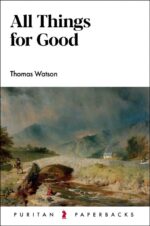Related products
-
All Things For Good (Thomas Watson) (#17)
$8.75First published in 1663 by the title A Divine Cordial, Watson simply but profoundly explains how God does in fact make all things – good and bad things – work together for the good of His people. By far the most useful explanation of Romans 8:28 ever written.
Watson said that two of the greatest obstacles he faced as a pastor were:
1) To make unbelievers sad, so they recognize their need of God’s grace, and:
2) To make believers joyful, in their experience of God’s grace!He wrote this book to make an effort to undo the second difficulty: by explaining Paul’s teaching in Romans 8:28. As for his own experience, Watson wrote this the year after he and 2,000 other ministers were expelled from the Church of England, and thus exposed to much hardship and suffering. This is the rich exposition of a faithful man who lived in circumstances when only faith in the Word of God could bring him such a confidence.
$10.00 -
The Way to True Happiness: Pocket Puritans Series (Ralph Venning)
$4.80Puritan Ralph Venning (1621-74) here proposes that true happiness is only to be found in understanding and doing the will of God. Venning was admired not only for his preaching but also for the consistency of his life. This, together with his powerful call to a pleasure-obsessed world to seek happiness only where it may be found, are perhaps the reasons why his writings continue to speak so powerfully to us today.
In this edition, English spellings have been updated as have some of Venning’s seventeenth century idioms, while quotations from Latin sources have been translated for the benefit of the reader unfamiliar with the language. The text, however, remains substantially Vennings’ and has not been abridged.
$6.00 -
Broken Cisterns: Thirsting for the Creator Instead of the Created (Sarah Ivill)
$10.75Today many of us are figuratively drinking from broken cisterns that hold no water. Rather than finding satisfaction in God, the Fountain of living waters, we seek to satisfy ourselves with the broken cisterns of this world, and we remain discontented.
In Broken Cisterns, Sarah Ivill exposes these broken cisterns—addictions to things like social media, physical appearance, shopping, sex, and others. She helps us understand why we are drawn to these things and how dangerous it is to seek contentment in them. Using Scripture, she also gently and practically leads us to the Fountain of living waters, who will transform our hearts and eternally satisfy our thirst.
$12.00




save
$3.25The Beatitudes (Thomas Watson)
$24.75
$28.00A new, high quality hardcover edition of Watson’s classic on The Beatitudes.
First published in 1660, Thomas Watson’s fresh, illustration, pointed and beautiful style of communicating God’s truth emerges again in dealing with Matt 5:1-12. No one follows Christ’s teaching method more closely than Watson, in employing a wide variety of illustrations from common life, speaking with a simplicity and charm that always presents truth in unforgettable colors.
Only 1 left in stock
The Beatitudes
An Exposition of Matthew 5:1-10
First published in 1660, Thomas Watson’s fresh, illustrative, pointed and beautiful style of communicating God’s truth emerges in opening up the “Beatitudes”, that is, Matthew 5:1-12. No one follows Christ’s teaching method more closely than Watson, in employing a wide variety of illustrations from common life. Watson speaks with a simplicity and charm that always presents truth in unforgettable color.
The opening verses of the best-known of all Christ’s sermons were handled by many of the Puritans, for the Beatitudes gave full scope to the combination of sound doctrine, practical wisdom and heart-searching application which characterized their preaching. In addition to these general Puritan characteristics, Thomas Watson added certain of his own: a master of a terse, vigorous style and beauty of expression, Watson could speak not only to win men’s understanding but also to secure a place for the truth in their memories.
More than most of his generation, Watson followed the example of Christ’s teaching by employing all sorts of illustrations from common life. With simplicity and charm he spoke and wrote in ways not easy to forget. 200 years after Thomas Watson’s death, William Jay of Bath said that he could go to any one of his books and ‘find it ever fresh, pointed and instructive.’
Endorsement
“A book that announces itself as an exposition of Matthew 5:1-10 turns out to be a digest of all the central Puritan teaching on the Christian life. The Beatitudes are treated as mineshafts into the whole economy of grace — as indeed they are.’
— J. I. Packer, author of Knowing God and Professor of Theology at Regent College, Vancouver, British Columbia, Canada
Table of Contents for The Beatitudes
About the Author
Thomas Watson (1620-1686), the Puritan preacher and author, was probably born in Yorkshire, although the exact place and date of his birth are unknown. He studied at Emmanuel College, Cambridge, where he was apparently a diligent student. Certainly his intellect is apparent in his writings, which show a profound grasp of the English language, as well as a solid understanding of Hebrew, Greek, and Latin. He quotes from the early church fathers, and his familiarity with the breadth of the scriptural canon is stunning. Cross-references from the entire biblical corpus are sprinkled throughout his sermons, revealing a deep understanding of many texts obscure to most modern day Bible students. A solid understanding of history, botany, medicine, physics, the classics, logic, and various trades are revealed in his sermons.
After living for a time with the Puritan family of Lady Mary Vere, the widow of Sir Horace Vere, Baron of Tilbury, in 1646 Watson went to St. Stephen’s, Walbrook, London, where he served as lecturer for about ten years, and then as rector for another six years. In about 1647, he married Abigail Beadle, daughter of John Beadle, an Essex minister of Puritan convictions. They had at least seven children in the next thirteen years, four of whom died young.
Times of Civil Unrest
During the Civil War, Watson began expressing his strong Presbyterian views. He had sympathy for the king, however. He was one of the Presbyterian ministers who went to Oliver Cromwell to protest the execution of Charles I. Along with Christopher Love, William Jenkyn, and others, he was imprisoned in 1651 for his part in a plot to restore the monarchy. Although Love was beheaded, Watson and the others were released after petitioning for mercy.
Watson was formally reinstated to his pastorate in Walbrook in 1652. Spurgeon says of him:
The Great Ejection
With the Act of Uniformity in 1662, Watson was ejected from his pastorate. He continued to preach in private whenever he had the opportunity. In 1666, after the Great Fire of London, Watson prepared a large room for public worship, welcoming anyone who wished to attend. After the Declaration of Indulgence took effect in 1672, Watson obtained a license for Crosby Hall, Bishopsgate, which belonged to Sir John Langham, a patron of nonconformists. Watson preached there for three years before Stephen Charnock joined him. They ministered together until Charnock’s death in 1680.
Watson kept working until his health failed. He then retired to Barnston, in Essex, where he died suddenly in 1686 while engaged in private prayer. Watson’s works are a legacy that have continued to be a blessing to those who love sound, heart-searching exposition of the Scriptures.
Other Writings of Thomas Watson